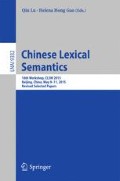Abstract
The category of subjective aesthetic was distinguished into automatic text categorization of natural language processing problem. The Song dynasty poems were collected and randomly divided into training set and testing set based on keyword features. Three classification methods, which are K-nearest neighbor, naive Bayes classifier and support vector machine, were used to classify the poems’ genres. Results showed that support vector machine can classify best and achieved above 95% accuracy.
Access this chapter
Tax calculation will be finalised at checkout
Purchases are for personal use only
Preview
Unable to display preview. Download preview PDF.
References
Qi, L.: Research and Implement of Classical Poetry Artistic Conception Classification. The master degree thesis of Donghua University (2014). (in Chinese)
Ly, L.: A study on term connection oriented NLP technique and its applications [Ph.D. Thesis]. Chongqing: Chongqing University (2004). (in Chinese)
Ying, L.: Statistical Linguistics. Tsinghua University Press, Beijing (2014)
Zhuqin, L.: 300 Hao Fang Ci. San Qin Press, Xi’an (2003). (in Chinese)
Yin, L.: 300 Wan Yue Ci. San Qin Press, Xi’an (2003). (in Chinese)
Jingsong, S., Changle, Z., Yihong, L.: The Establishment of the Annotated Corpus of Song Dynasty PoetryBased on the Statistical Word Extraction and Rules and Forms. Journal of Chinese Information Processing 3 (2007). (in Chinese)
Guizhang, T.: Quan Song Ci. Zhonghua Book Company, Beijing (1965). (in Chinese)
Yong, Y.: A Study on Style Identification and Chinese Couplet Responses Oriented Computer Aided Poetry Composing. Ph.D. Dissertation of Chongqing University (2005). (in Chinese)
Chunlong, W.: The Research of Computer Assistant Analysis on Chinese Song Poems’ Style. The master degree thesis of Xiamen University (2008). (in Chinese)
Zhou, C.L.: An Introduction to Computation of Mind and Brain. Tsinghua University Press, Beijing (2003). (in Chinese)
Cortes, C., Vapnik, V.: Support-vector networks. Machine Learning 20(3), 273 (1995)
Author information
Authors and Affiliations
Corresponding author
Editor information
Editors and Affiliations
Rights and permissions
Copyright information
© 2015 Springer International Publishing Switzerland
About this paper
Cite this paper
Mu, Y. (2015). Using Keyword Features to Automatically Classify Genre of Song Ci Poem. In: Lu, Q., Gao, H. (eds) Chinese Lexical Semantics. CLSW 2015. Lecture Notes in Computer Science(), vol 9332. Springer, Cham. https://doi.org/10.1007/978-3-319-27194-1_48
Download citation
DOI: https://doi.org/10.1007/978-3-319-27194-1_48
Published:
Publisher Name: Springer, Cham
Print ISBN: 978-3-319-27193-4
Online ISBN: 978-3-319-27194-1
eBook Packages: Computer ScienceComputer Science (R0)

